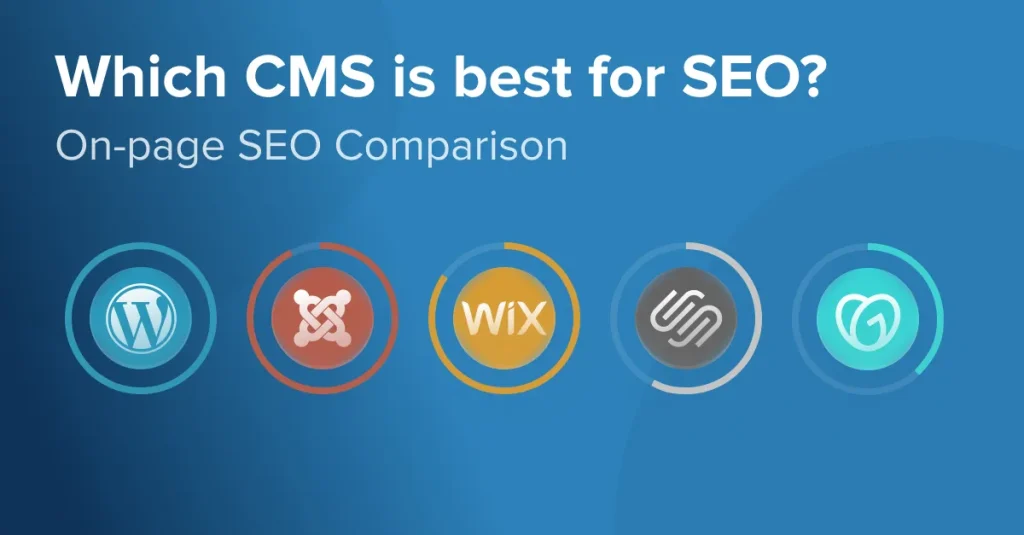The sites on CMS platforms with optimized SEO content create 3.2 times more organic traffic compared to those on closed ones. The correct Content Management System is the difference between a successful search engine ranking and one that cannot be overcome, whilst creating elements of ease-of-use and technical control. But which CMS is Best for SEO?
In this blog post, you’ll learn how CMS architecture impacts indexing, speed, and structured data, explore plugin ecosystems, and discover when to prioritize simplicity versus customization for maximum SEO impact. Drive organic traffic to your store with our Shopify SEO Services!
SEO CMS Evaluation Criteria
A CMS’s SEO performance hinges on several non-negotiable features:
- Site Speed
- URL Flexibility
- Structured Data
- Mobile Optimization
- Plugin Ecosystem
- Security & Scalability
These features, amplified by speed, security, and scalability, determine a CMS’s SEO potential.
Read more: How to use Ahrefs Keyword Explorer?
Head-to-Head CMS Comparison
| Platform | SEO Strengths | Weaknesses | Best For |
| WordPress | • #1 plugin ecosystem • Full HTML/CSS control • Automatic image sitemaps | • Requires caching/CDN for speed • Security upkeep needed | Blogs, SMBs, Content-heavy sites |
| Shopify | • Built-in canonical tags • Automatic JSON-LD schema • CDN + SSL default | • Limited URL structure control • Duplicate content issues | E-commerce stores under 10K SKUs |
| Webflow | • Visual schema editor • Exportable clean code • Automatic alt text optimization | • No native blog pagination • Limited .htaccess control | Design-driven sites, Agencies |
| Drupal | • Taxonomy power for large sites • Granular redirect management • Enterprise scalability | • Steep learning curve • Module conflicts | Universities, Government, Large publishers |
| Wix/Squarespace | • Simple meta tag editors • Decent mobile optimization | • No regex redirects • Limited canonical control | Service businesses, Portfolios |
Get expert web design and development services to build a fast, SEO-friendly website!
Plugin/Tool Ecosystems Ranked
| Task | WordPress | Shopify | Webflow |
| Technical Audits | Semrush, Screaming Frog | Limited apps (SEO Booster) | None (manual) |
| Schema Control | RankMath PRO (flexible) | JSON-LD for SEO (basic) | Native visual editor |
| Redirect Chains | Redirection Plugin (free) | Loop app (paid) | Manual exports |
| Log File Analysis | Plugin-ready (e.g., Jetpack) | Impossible | Impossible |
Winner: WordPress dominates with its vast, flexible plugin ecosystem.
Boost your local rankings with expert SEO Services in The Woodlands!
The Verdict
Which CMS is Best for SEO?
- To attain the highest degree of control over the SEO process and scalability, nothing compares to WordPress in 2025, based on its strong plugin system and the complete control over HTML/CSS, but it requires technical maintenance.
- Shopify is good at e-commerce, has an in-built schema and CDN, and is not good at strict URLs.
- Webflow offers a balance of design and SEO for lean teams.
- While Drupal powers enterprise giants with unmatched taxonomy.
- Wix/Squarespace suits simple sites but lacks advanced SEO depth.
Is Shopify down? Find out what happens if it stops working!
87% of SEO value lies in content quality, so choose a CMS that enhances your workflow. Whether you prioritize speed, customization, or simplicity, align your CMS choice with your content strategy to dominate organic search.
Final Tip: Start with a free SEO audit using Google Search Console and prioritize one high-impact tool to kickstart your rankings! Boost your brand with the Best Digital Marketing agency!

